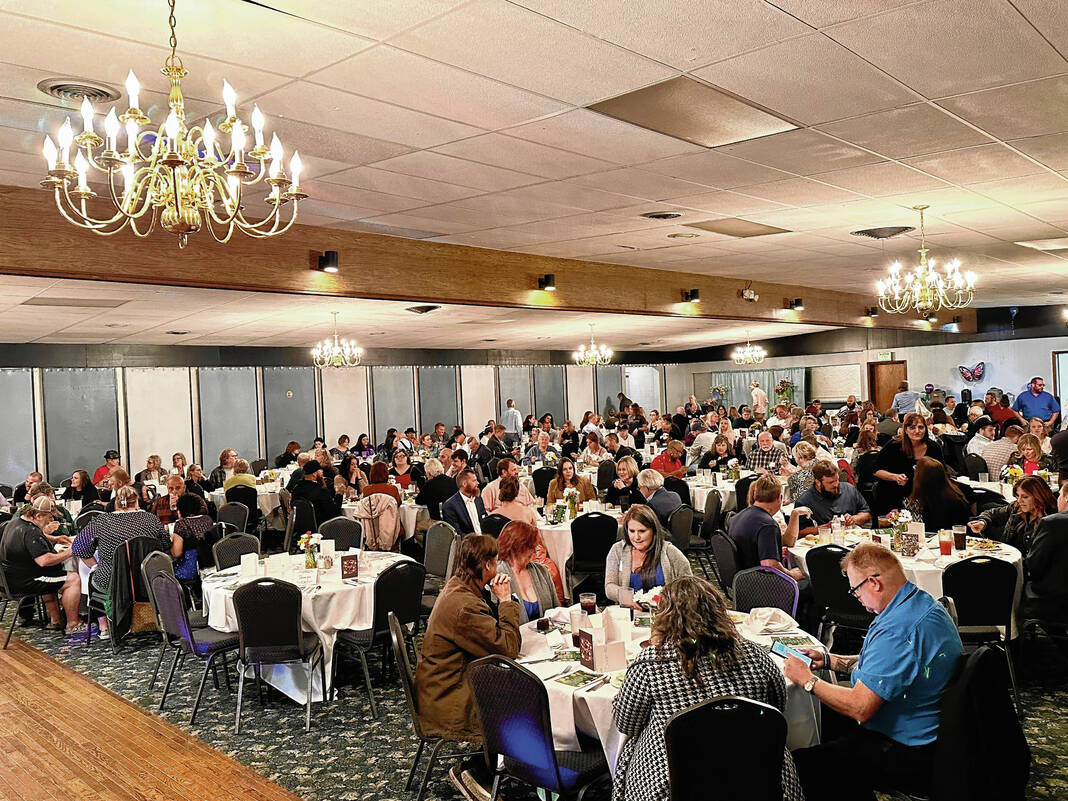
Guests filled The Pines Evergreen Room for the second Recovery Recognition Dinner on Friday evening.
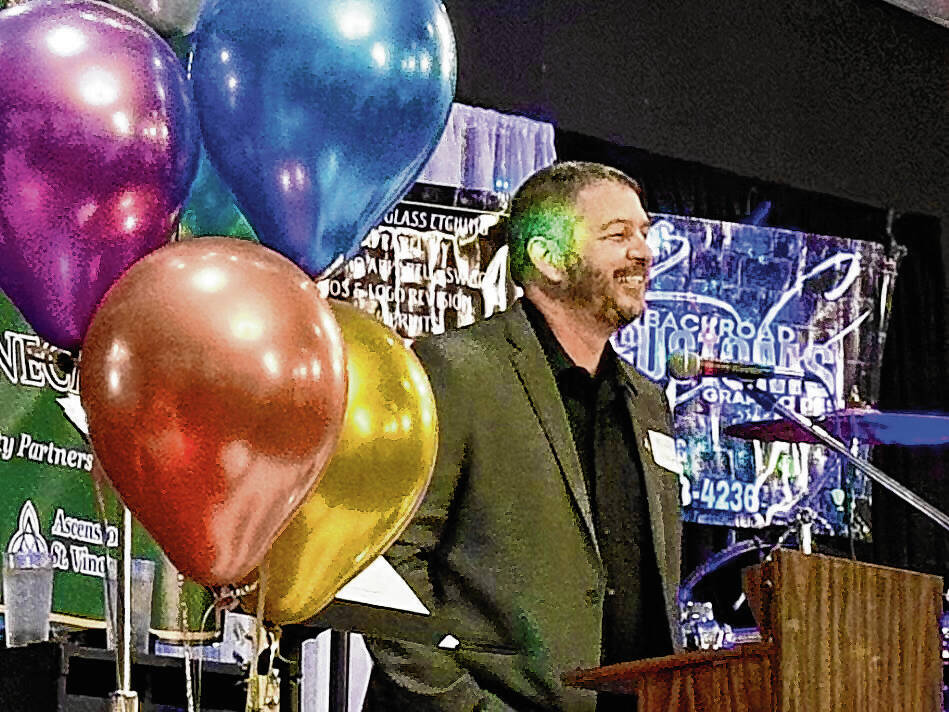
Mayor Matt Nicholson gave opening remarks for the dinner, encouraging guests to keep fighting the battle within.
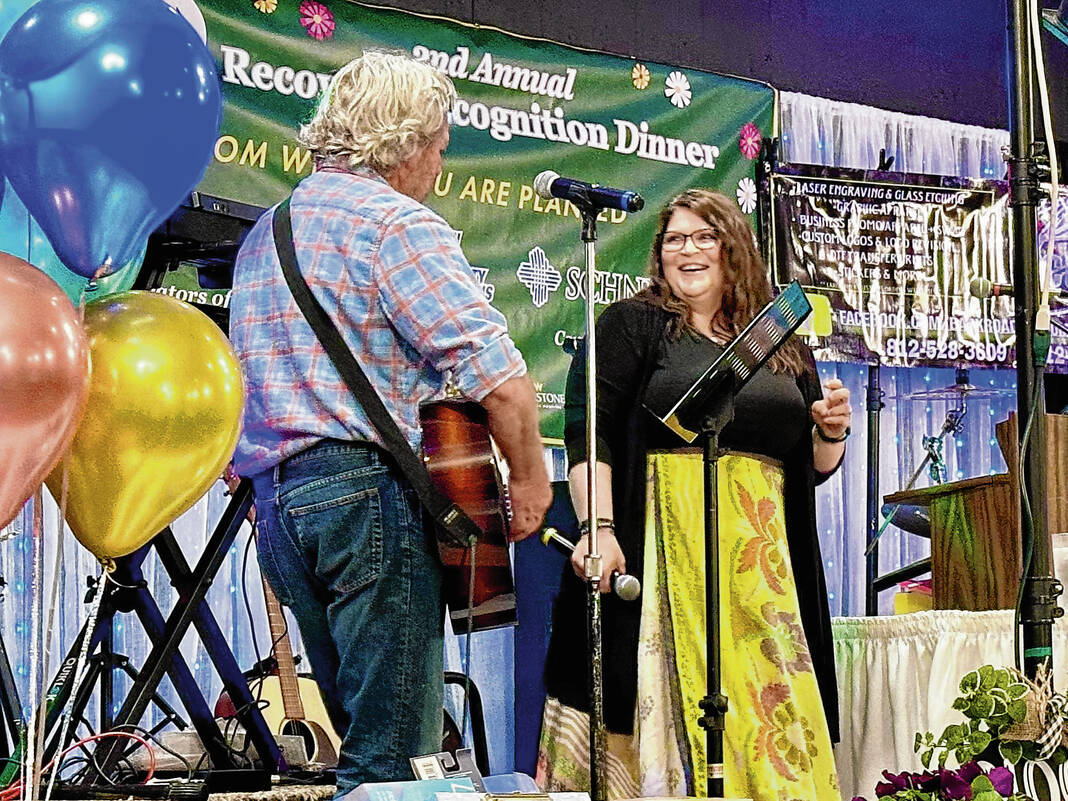
Dwight Hendrix, left, and Jennifer Hopkins performed live music for dinner guests as they made their way to the buffet lines.
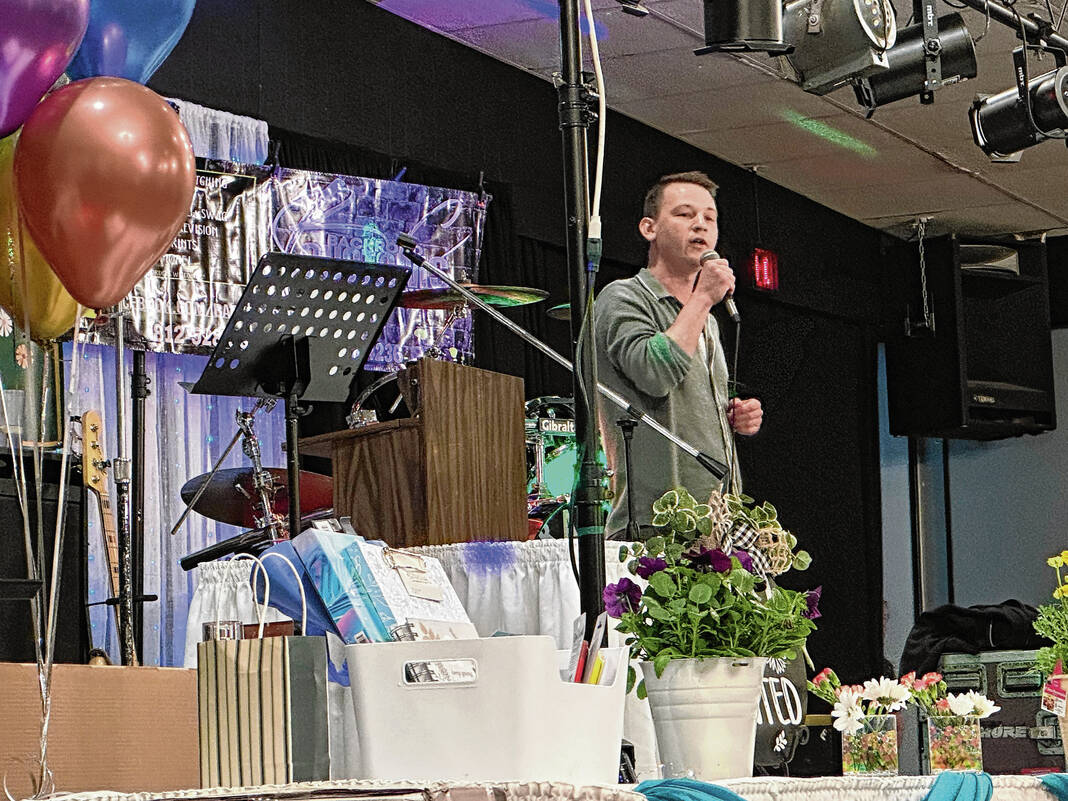
Comedian Patrick Eaton of Terre Haute performed a set for guests at the 2nd Recovery Recognition Dinner.
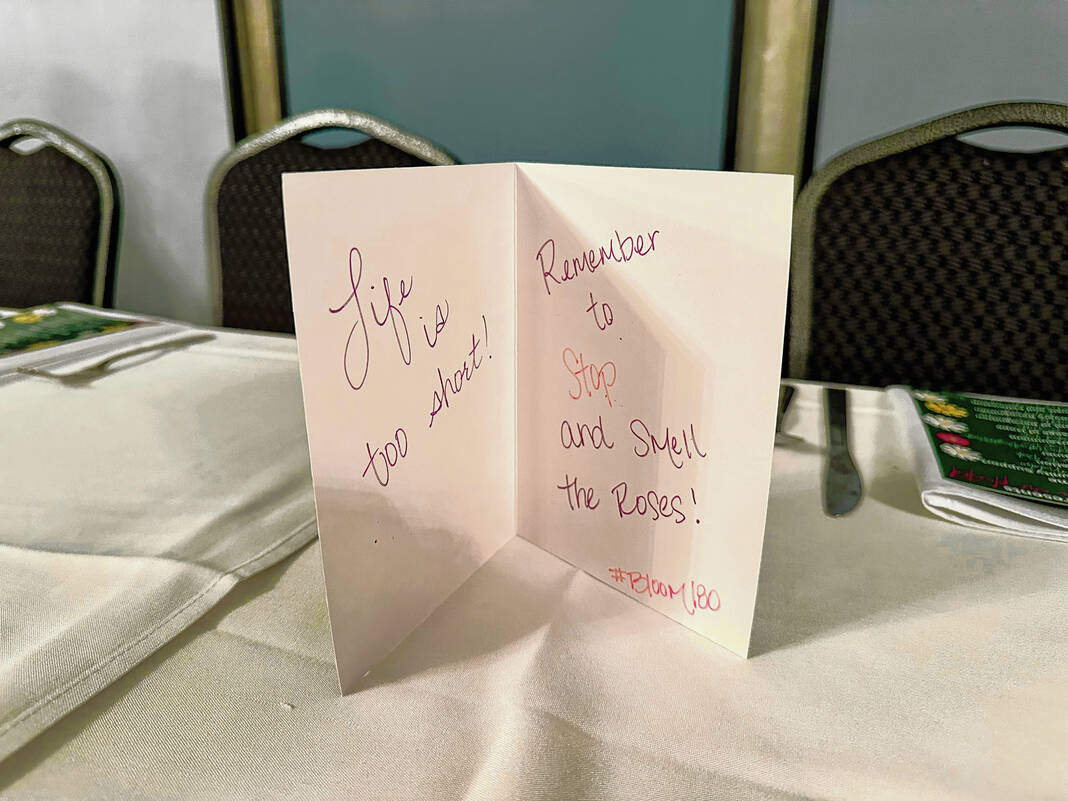
Cards with inspirational sayings from 180 Recovery were placed on guests’ tables.
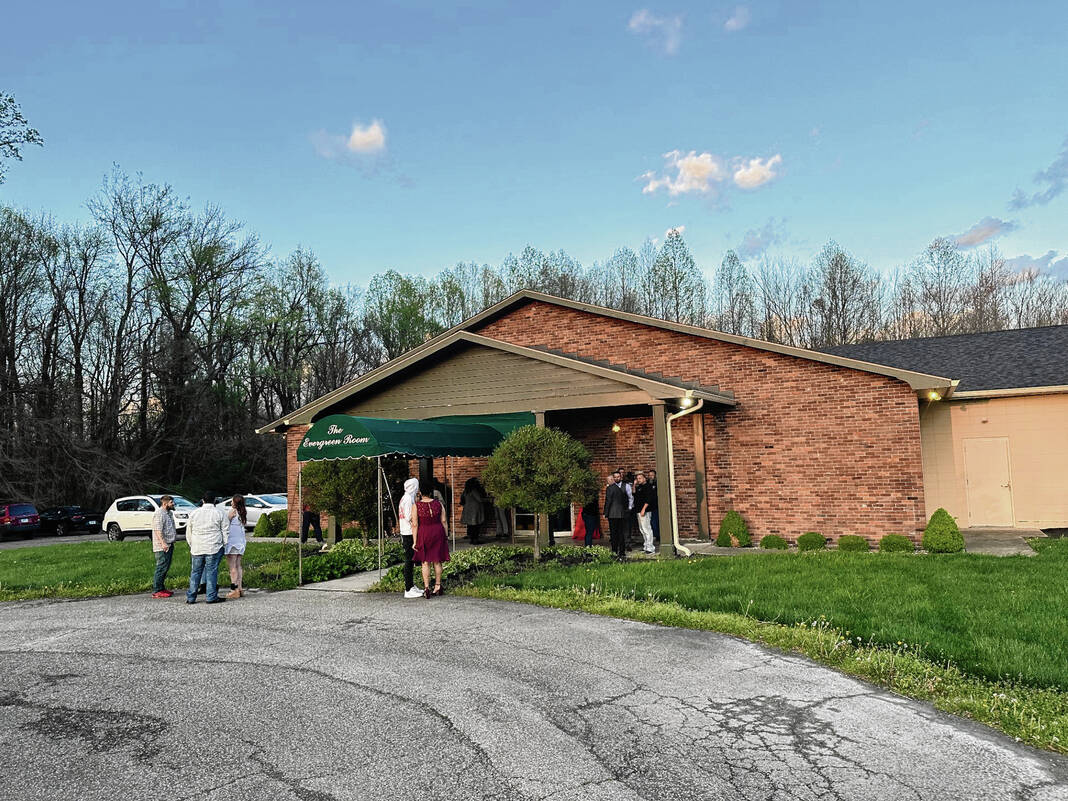
The second Recovery Recognition Dinner was held on Friday evening at The Pines Evergreen Room in Seymour.
8.4% of Hoosiers met the criteria for a substance use disorder (SUD) and 7.8% needed but did not receive SUD treatment in the past year, according to a report released by the IU Richard M. Fairbanks School of Public Health in 2023.
According to a report of information gathered by the Jackson County Recovery Program, in the 3rd quarter of 2021, the numbers of opioid prescriptions per 1,000 Jackson County residents exceeded the state rate by about 211%, and Jackson County exceeded the state rate of excessive drinking by 31%.
In celebration of Jackson County individuals who have committed themselves to the path of recovery, the second Recovery Recognition Dinner was held Friday evening by 180 Recovery at the Pines Evergreen Room.
180 Recovery is an emerging Recovery Community Organization (RCO) governed and operated by members of the local recovery community of Jackson and Jennings counties.
“The mission of an RCO is to “mobilize resources within and outside the recovery community to increase the prevalence and quality of long-term recovery from alcohol and other drug addictions.” said Ben Beatty, recovery outreach coordinator for Centerstone and executive director of 180 Recovery.
The dinner commenced with opening remarks from Seymour Mayor Matt Nicholson.
Nicholson said in January of 2022 he invited 12 people in recovery themselves and 12 people who were working in the field of recovery to sit down with him at city hall.
“It would have been super easy to invite the normal healthcare professionals and the normal list, if you will, but that’s not who I wanted to hear from,” Nicholson said. “I wanted to hear from people fighting the battle.”
After a couple weeks of regularly meeting, Nicholson said he received a phone call letting him know there was grant possibility of $100,000 from the Family and Social Services Administration of Indiana to go toward support for those in recovery. Thanks to that grant, which had to be written in a mere 11 days, the Seymour & Jackson County Recovery Program was formed.
Later in the year, work began on the aforementioned report by the Jackson County Recovery program for 12 to 14 months.
Steve Sharer, program coordinator for the recovery program, led the work on the study. Shortly after the report was released in 2023, 180 Recovery was formed.
“From the very first meeting, the question was asked, ‘Why don’t we do a recovery event different?’” Nicholson said. “We’ve all been to recovery events, right? We’ve been to the parks; we’ve had a good time. But how about something different? Something where we put on the button-up shirt and jacket; something where we worry about choking ourselves out with a necktie.”
After the report was released, a local elected official said the Jackson County community at large does not want recovery programs, as the community does not want “those people” in Jackson County, Nicholson said.
“So far from the truth; look around this room and tell us we don’t want people,” Nicholson said to applause. “‘Those people’ is a statement that takes away faces; it takes away names; it makes it a group of people that you don’t have to look at and you don’t have to answer, because all of sudden they’re just a faceless blur.”
Nicholson said an individual who raised concerns about recovery programs in March of 2022 shifted their worriment six months later to a topic regarding transgender people and then to the Latino population of Jackson County.
“So don’t worry folks, it’s not just against you,” Nicholson told dinner guests. “That person wants me to lump everybody into one large group and pretend you don’t have faces and names. When I look around this room, I don’t see that; it’s never how I have viewed the world … I see all of you. All of you have a face, you have a name and you have a story. I see other humans; other humans in need, waiting for us to be of service to them. Here within this group, you have your names and you have your faces and you’re winning the battle within.”
After his opening remarks, Nicholson had dinner guests take out their phones and take a look at one of two photos he had everyone take before he began to speak — either that of a selfie or of a friend at their table. He said he hopes everyone sees the strength in the photo they chose to look at.
“When you look at that picture, you’re probably going to see some vulnerability there, because we all have our own demons to face,” Nicholson said. “You’re probably going to see someone who is successfully fighting a great fight.”
The Rev. Teresa B. Poole of First United Methodist then gave an invocation and blessed the food.
Poole said one of her favorite things to do is spend time with people in recovery and people currently suffering from addiction who are trying to get on the road to recovery.
“I know way too many people in recovery who have been through hell, have pulled themselves out of hell and are willing to reach back in and pull someone else out,” Pool said. “That’s why I love spending time with people in recovery.”
As people steadily made their way table-by-table to the buffet lines, Jennifer Hopkins and Dwight Hendrix performed music live on stage.
Hopkins shared her history with Hendrix, including the story behind a song titled “Runaway Girl” that Hendrix wrote about Hopkins (“She fought off her addictions / Even spent a little bit of time in prison / She’s trying real hard to start a brand new life”).
Hopkins said she had been sober for about 75 days by the time she began to work at Hendrix Pool. She always told Hendrix she had songs in her head that she’d love for him to write for her, but he had always refused because she sang like Aretha Franklin and he sang like Willie Nelson. Then, Hendrix was inspired one day.
“As life happens in early recovery and you stop making bad choices, it doesn’t mean that things in your past don’t follow you,” Hopkins said. “Some stuff was following me and I was going through it, and Dwight found me in the barn of Hendrix Pool in tears sitting on a case of chlorine — he tried to help but you know how that goes sometimes. What happened then was he took my tears and he used them as inspiration. So, while this song is technically written about me, this song is not just about me — it’s about every man, woman and child fighting for their life.”
As dinner came to a close, comedian Patrick Eaton of Terre Haute — sober for three years now — took to the stage. Eaton joked about topics ranging from ghosts, being sentenced to house arrest and working at Burger King (“When you work at Burger King, you can barely afford to work at Burger King.”)
“When I got pulled over for my final DUI that got me sober, the cop was not nice about it,” Eaton joked. “He put the cuffs on me and he put me in the back of the car, and I saw on his dashboard this sticker saying, ‘You need to thank the police, because we leave the house everyday not knowing if we’ll make it home safely’, and I was like, okay, but that’s what I was doing drunk-driving — and I wasn’t asking people to love me because of it.”
Following Eaton’s performance, Tina Hobbs — member of Cornerstone Community Church and undergraduate at Colorado Technical University studying criminal justice with a specialization in chemical dependency — gave a message of hope.
Hobbs said she was an addict for 15 years, “busted, disgusted and not to be trusted.” She said she has been arrested more than 20 times, did not have a driver’s license for 10 years and lost custody of her children.
“It definitely had become unmanageable, but let’s talk about today,” Hobbs said. “Today, I’m a far cry from that girl; that girl whose disease of addiction, a disease based in fear compounded by low self-esteem, rendered her hopeless. Today, I stand before you strong in my recovery and strong in my faith.”
After Hobbs’ remarks, Sara Bowling — peer recovery coach at Schneck Medical Center — presented the Humble Servant Award to Jason Davis in honor of his wife, Janet Davis, who passed away earlier this year.
Jason and Janet co-founded the Leaving the 99 Ministries, a community of more than 600 online followers from Jackson and surrounding counties which helps people suffering from addiction, harmful behavior, homelessness and thoughts of suicide. The name of the ministry is in reference to Matthew 18:12: “What do you think? If a man has a hundred sheep, and one of them gets lost, will he not leave the ninety-nine on the mountain and go in search of the one that is lost?” (AMP).
“I miss her,” Jason said. “She was my favorite person, because she loved everybody. We would spend hours and hours talking about everybody and she would pray for hours on end. I asked her one time, ‘How can you sit here and pray for so many hours for people?’, and she said ‘If I can’t love them, no one will.’”
Following Jason’s speech, Bowling introduced Rachael Fenton to the stage to lead a moment of recovery recognition. Fenton asked guests to stand up and receive applause after she called out the number of years, months or days they had been sober.
The dinner ended with a raffle, with prizes such as a Bluetooth speaker, gift cards, a Keurig coffee maker (with two bags of coffee from Moxie Coffee Company), a 30-piece platinum pan set, potted plants and a 65-inch television.
After the raffle, guests were invited to stay and listen to live music performed by Paradigm, a band native to Seymour.
The dinner was sponsored by “Ambassadors of Hope” Jackson-Jennings Community Corrections and Schneck Medical Center; “Creators of Change” Centerstone, Indiana Health Centers, the city of Seymour and Laurilyn Floral Design; and community partners Wellstone Regional Hospital, First Baptist Church of Seymour and Ascension St. Vincent.
